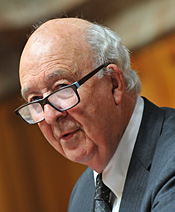Why Awarded
Peter Brown has worked at the highest level of scholarly creativity for more than 40 years. His books have captivated thousands of readers, and his celebrated lectures and seminars have inspired younger scholars around the world. His work reformulated the history of the Mediterranean world from the 2nd to the 11th century, viewing it as a coherent historical period whose continuities are far greater than its moments of disruption. Brown ranks with the greatest historians of the last three centuries; few scholars have changed their fields as much as Peter Brown has changed the study of what was called ancient and medieval history. Throughout his scholarship, Brown reconceived Western history, seeing the rise of Christianity as the emergence of a new social and intellectual world long before the Renaissance.
Citation
"He is one of the most readable and literary historians of our time, having brought to life both a host of fascinating, little-known people from ordinary life during the first millennium of Christianity, as well as a monumental biography of the most prolific and famous St. Augustine."
-Librarian of Congress James H. Billington
Press
- Historians Share 2008 Kluge Prize
The Washington Post - Dec. 3, 2008 - Brown Wins Lifetime Achievement Award
The Daily Princetonian - Dec. 5, 2008
Bio
As both scholar and teacher, Peter Brown has worked at the highest level of scholarly intensity and creativity for more than 40 years. His books have captivated thousands of readers, and his celebrated lectures and seminars have inspired students and younger scholars around the world. Brown has opened up our understanding of the world of late antiquity and has reformulated the history of the Mediterranean world from the 2nd or 3rd century to the 11th century C.E., as a coherent historical period.
Brown launched his career with an extraordinary biography, "Augustine of Hippo" (1967). Drawing on massive traditions of historical and ecclesiastical scholarship, he sought to understand the experiences and sensibilities that characterized the various phases of Augustine’s life. Brown offered profound interpretations of the most demanding of Augustine’s writings, presenting his analyses in vivid prose that does justice to technical scholarly debates while still remaining accessible to non-specialists.
In 1971 Brown brought out what remains perhaps his most effective synthesis, "The World of Late Antiquity." Using a vast range of sources, visual as well as verbal, he described the evolution of pagan philosophy and the rise of Christianity as part of a single social world. Fascinated by the figures of saints who spent their lives on pillars and hermits and monks who inhabited desert sites, Brown tried to enter their worlds and empathetically to imagine the reasons for their actions. He also traced the story of late antiquity forward into the rise of new empires and civilizations in Persia, the Islamic world, and in Byzantium as well as Western Europe. Brown saw 200–1000 C.E. as a whole period that had not previously been seen as such; and he set the agenda for a new field of study and influenced many in other areas.
In his "Cult of the Saints" (1981), Brown put to rest the tendency to think of a theological elite as separate from a superstitious, pagan populace. His "The Body and Society" (1988), an extension of his work on Augustine, inquires deeply into the meanings of a life devoted to holiness, as seen in the works of great Christian thinkers. It helped create the new field of "body history," so important for psychohistory and gender scholarship. He saw asceticism not as rejection of the world but as, in complicated ways, a powerful force within it.
As Brown developed linguistic capacity in Arabic, Persian, Syriac and Turkish, as well as in the major classical and European languages, he reconceived Western history from the sixth to the 11th century as a pan-Mediterranean era in which Islam played a fundamental role, and he saw the rise of Christianity as the emergence of a new social and intellectual world long before the Renaissance.
 Peter Brown
Peter Brown
The Creator of a New Historical Epoch
Kluge Prize Recipient 2008
Quick Facts
Born:
1935, Dublin, Republic of Ireland
Field:
History
Positions:
Fellow, All Souls College, Oxford University
Professor, Royal Holloway College, University of London
Professor, University of California at Berkeley
Rollins Professor of History Emeritus at Princeton University
Ceremony Links
Prize Awarded:
December 10, 2008
Acceptance Speech:
Watch Video
News Release:
Historians Brown, Thapar Named Recipients of Kluge Prize
(Dec. 3, 2008)
Selected Publications
- "Augustine of Hippo: A Biography" (1967)
- "The World of Late Antiquity: AD 150-750" (1971)
- "The Cult of the Saints: Its Rise and Function in Latin Christianity"
- "Society and the Holy in Late Antiquity" (1982)
- "Authority and the Sacred: Aspects of the Christianization of the Roman World"
- "Poverty and Leadership in the Later Roman Empire" (2002)
- "The Rise of Western Christendom" (2003)
